Preview CL group stage matchday 2: Tottenham Hotspur FC against FC Bayern Munich
Karl-Heinz Rummenigge called the game a very hard test. Niko Kovač said at a press conference: “Tottenham is a team of extraordinary quality. They will push us to our limits.”
The contest with Tottenham will indeed be the first opportunity for Bayern to lay down a marker on the international stage this season because in Tottenham, they will face a team that has consistently performed at very high level both individually and as a team in recent years.
That the game comes now plays into Bayern’s hands. They are currently first in their group’s table and they could suffer a loss without severely harming their chances of progressing through to the knockout stages. An early clash with one of last year’s finalists also allows Bayern to identify and remedy potential fundamental problems in their game at a still relatively early point in the season.
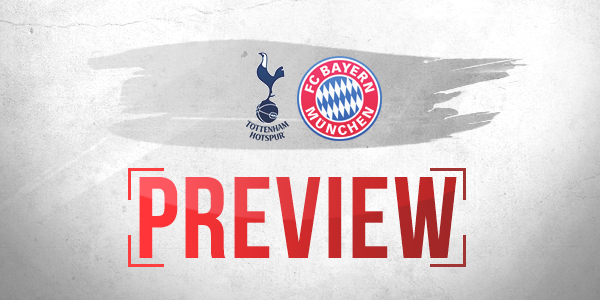
Tottenham: a team out of form?
All of this notwithstanding, the game will not allow for an accurate prediction of both team’s chances in this year’s Champions League. For this, it comes much too early. Presuming that both teams will qualify for the knockout stages, there is still a long way to go before the critical matches arrive in early spring next year.
Tottenham seems like a team out of form at the moment. They have got eleven points and three wins from seven games in the Premier League so far. Last Tuesday, they were eliminated from the Carabao Cup on penalties against League 2 team Colchester United after a goalless 90 minutes. Their first Champions League match against Olympiacos ended in a 2-2 draw.
All of this indicates that Tottenham is a far cry from the level of performance that has made them so successful in recent years at present. Let us begin by taking a look at their tactical approach:
Tottenham’s potential tactical setup on Tuesday
Mauricio Pochettino has been tinkering quite a bit with his team’s formation in recent years. Currently, he appears to be favouring two very similar formations. The first is the 4-2-3-1:
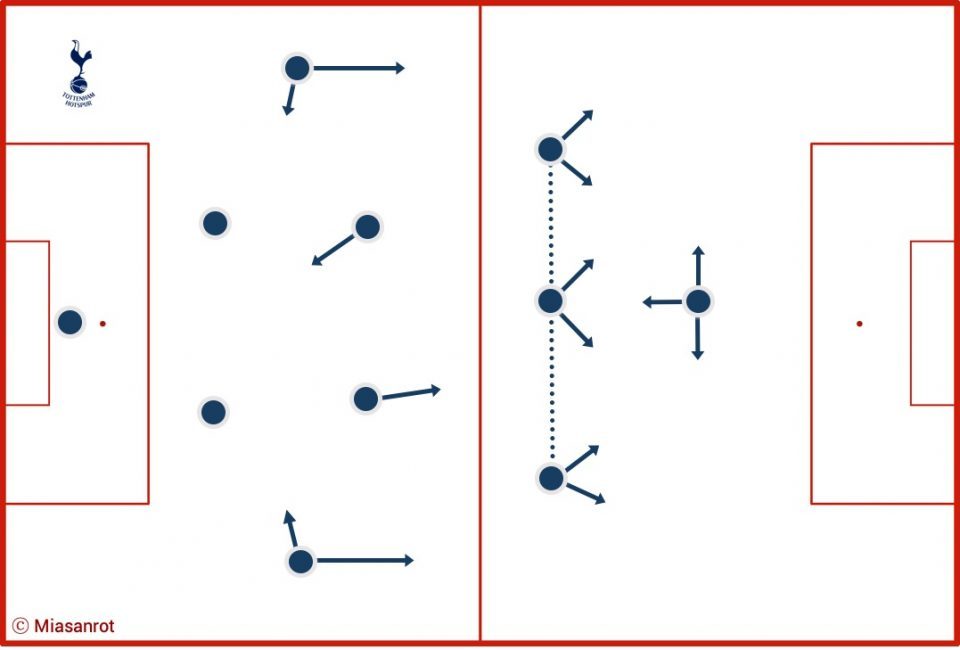
This graphic shows what we are going to elaborate in greater detail later: Pochettino uses his full-backs to provide width and positions his wingers a bit more centrally. On this basis, the three offensive players behind centre-forward Harry Kane keep rotating at irregular intervals, which lends a certain degree of unpredictability to Tottenham’s offensive play. More recently, however, Pochettino has preferred a 4-1-3-2 formation. Tottenham started this way in their last two Premier League matches, the defeat against Leicester (1-2) and the win against Southampton (2-1).
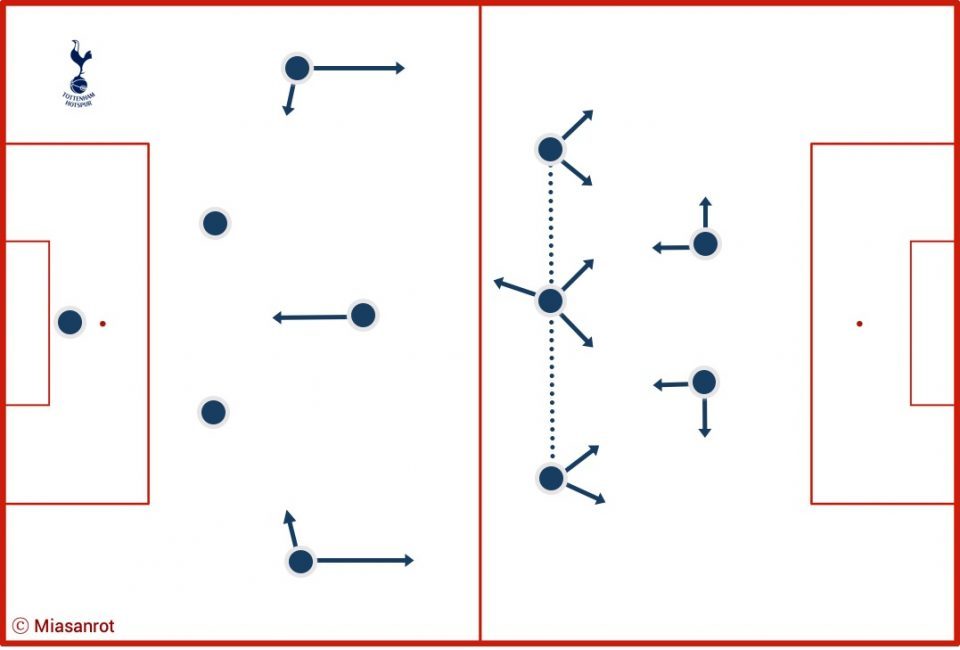
The 4-1-3-2 has one fewer defender, which may provide a bit less stability at the back, but there is a second striker besides Kane, which allows for greater firepower in attack especially against smaller teams who sit back defend compactly. The shift may have come as a reaction to the weak start to the season, but because Tottenham often has problems in transition in this formation, we expect Pochettino to start his team in a 4-2-3-1 against Bayern.
Compact and versatile 4-4-2 against the ball
Tottenham is a team that feels at home in all phases of a game. Their game against the ball has stood out during the last years by its aggressiveness, compactness, and clever pressing traps. As a result, they have been a very strong team in counterattacks, which they usually exploit with great efficiency. But Pochettino’s team has also been very proficient on the ball. They are very skilled at circulating the ball and moving it forward through a flurry of quick, clever passes.
Bayern will encounter a team that is able to vary the intensity of their pressing according to the demands of the situation. Tottenham will probably try to block the centre through tight man marking. Pochettino will certainly have something special in store for this as he has demonstrated in the matches against Manchester City and Ajax Amsterdam in last year’s Champions League.
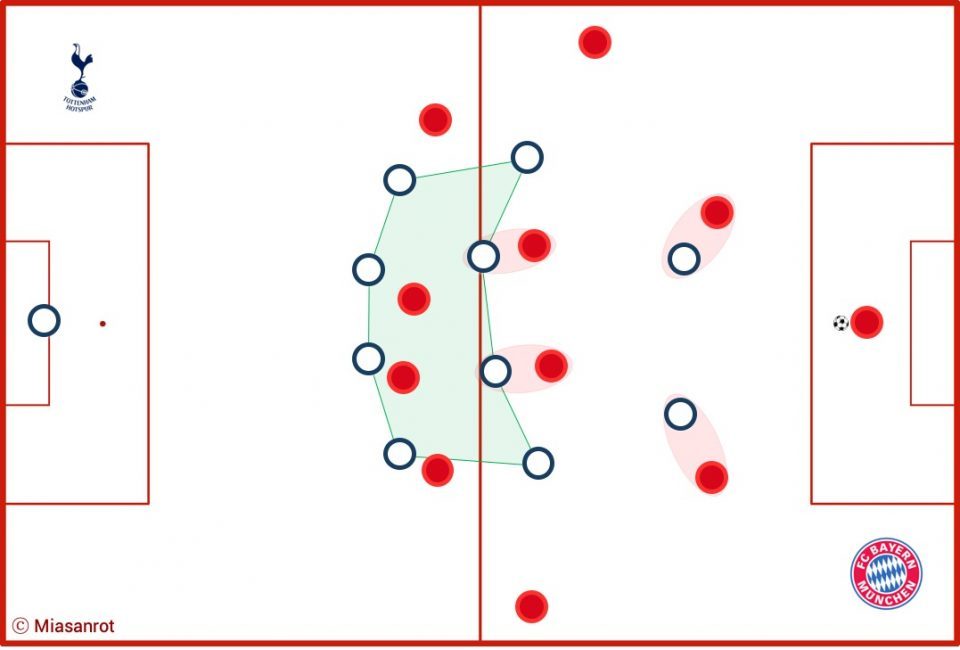
Tottenham will most likely try to mark Bayern’s two holding midfielders out of the game. The focus wil be on Thiago. He is the conductor of, and pivotal figure in, Bayern’s build-up play. Bayern got a taste of what will await them against Tottenham in the match against Paderborn on the weekend. Paderborn plays in a similar style as Tottenham, only more frantic and aggressive. Yet Tottenham is much better skilled than Paderborn at keeping a tight shape and occupying the areas between the lines, which does not afford their opponent a lot of space for passing and building up through the center. At the same time, they know how to close down the route through the flanks as soon as the opponent moves the ball there for lack of a better option:
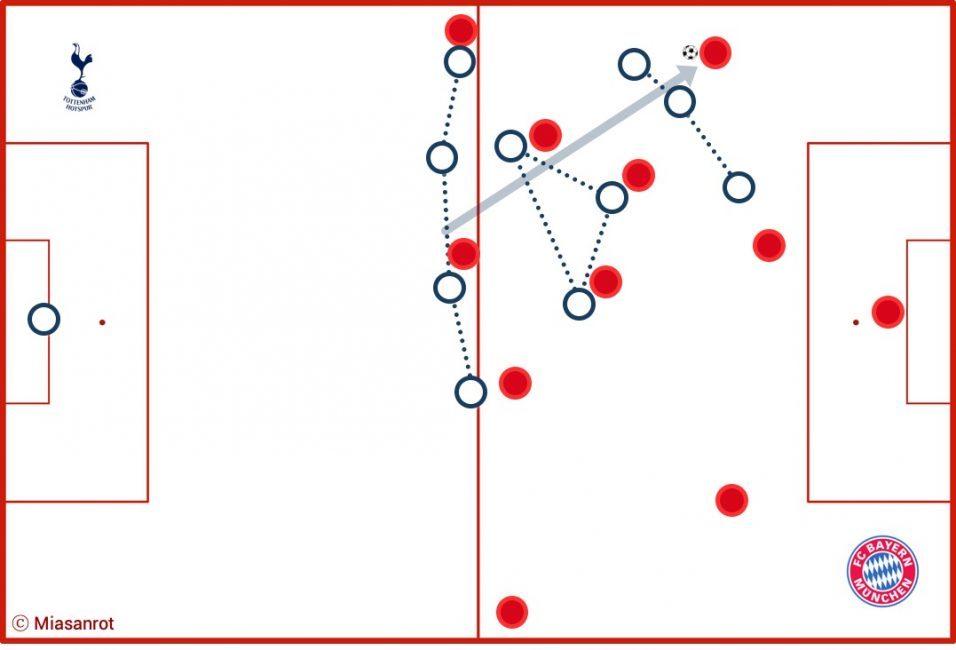
This graphic shows what Bayern may have to deal with: when the opponent plays the ball out to the wings, Tottenham as a unit moves out with the ball, springs the pressing trap and puts considerable pressure on the right-back.
Solutions for Bayern
But Tottenham is not perfect. At an average of 1.3 expected goals against since the beginning of last season, they are way behind other teams at their level like Liverpool and Manchester City. In a sense, they currently evince the same problems as Paderborn. Their 4-4-2 is sometimes too compact.
Leicester, Manchester City, and Arsenal already knew how to capitalise on this this season by overloading the center in order to create passing options to move the ball forward. Against Paderborn, Bayern demonstrated that they are capable of this too. A number of their attacks were built up aptly through the center.
Paderborn crowded the centre in a very tight shape and always shifted with the ball, which made them susceptible to long shifts of play or quick sequences of passes that went around their huddle of bodies. Bayern did this frequently and would be well advised to do the same against Tottenham too. Tottenham has difficulties in maintaining the quality of their pressing for an entire match at the moment. Olympiacos created a number of good chances through the right flank by keeping their players moving around constantly. Tottenham appeared not to know quite when to hand over and pick up Olympiacos’s players. Often, this happened too soon or too late, which gave Olympiacos’s players space and time to exploit for their attacks.
Tottenham seems to need time to settle still. The pre-season additions to their squad are not yet fully integrated and the team’s confidence appears to suffer from their unaccustomed tactical issues. In Bayern, they will be host to a team that has proven to be very apt at taking advantage of such weaknesses.
Adding fuel to the engine room
Of course, Tottenham is of a different calibre than Paderborn. But with Thiago, Joshua Kimmich and Couthino in midfield, Bayern should have enough quality to challenge Tottenham in the center. It will be key for Bayern to ensure that the player in possession always has support around him – also as a means to defuse Tottenham’s gegenpressing. Because if Bayern should lose the ball, they have had a high probability of conceding a goal lately. And Tottenham does not need to many chances to score. When they win the ball, they often do not need more than four or five touches to finish an attack.
But Bayern should not shirk from taking the risk. If they try to circumvent Tottenham’s crowded center via playing through the wings, they might be caught out by Tottenham’s pressing there. Fortunately, in Kimmich and Thiago Bayern has two deep-lying playmakers who are resistant to pressure and thus make it possible to build up through the middle. Moreover, Pavard has proven to be a reliable safety at the back. As a result, Bayern was able to conduct their build-up play in a very calm, controlled, and versatile manner against Paderborn.
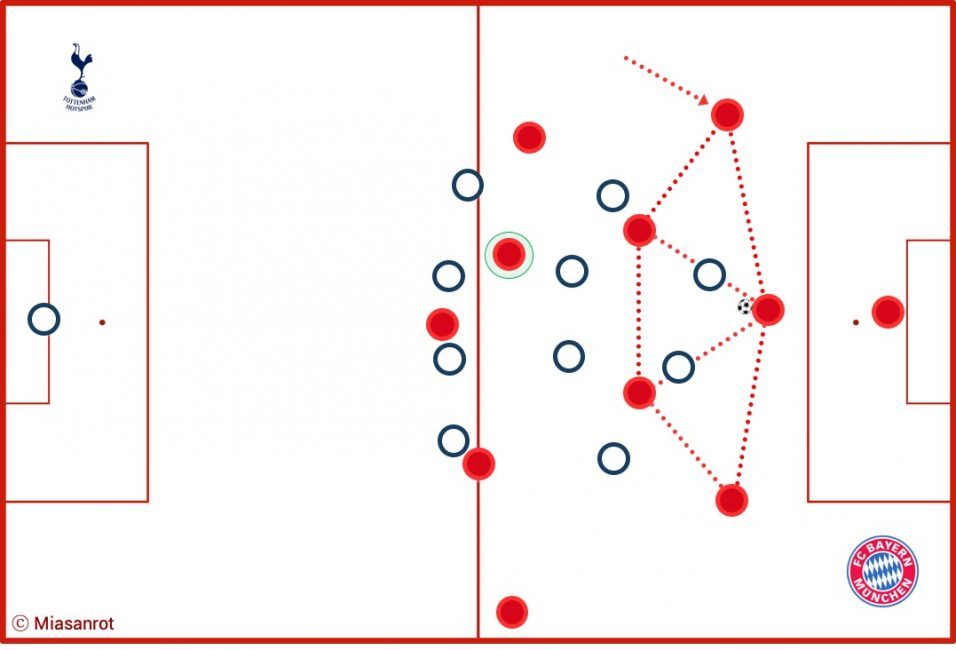
Bayern often had troubles in linking up defense and offense in the past. Coutinho (circled green) seems to be a solution to this problem. He is very skilled at finding and moving in and out of the spaces between the lines and always makes himself available as a passing option for his teammates. With his profile, he could become the key player against Tottenham.
Balancing risk and reward
Bayern’s performance against Paderborn allowed for several interesting conclusions. In the first half, Bayern was able to very capably exploit the weaknesses of an equally compact and aggressive opponent. They completely took the sting out of Paderborn’s game by consistently playing over or around them. Only a few individual lapses of concentration led to some chances for Paderborn. Bayern played a markedly inferior second half, which however has to be gauged separately because of Kovač’s personnel changes during half time. These entailed adjustments in Bayern’s structure that did not quite fit to Paderborn’s deficits as well as in the first half, decreasing Bayern’s level of control.
Nevertheless, on the plus side for Bayern there is a midfield trio that is able to control and dominate a game – if they only manage to strike a balance between risk and security. Kimmich, Thiago, and Couthino are extraordinary technicians. In most cases, they use their exceptional skills for the benefit of their team, but sometimes they tend to overdo it. It is for their teammates to act as a failsafe in such situations. The integration of Coutinho especially is still a work in progress. Once he and his teammates have developed a deeper and more intuitive understanding of one another, he has the ability to elevate Bayern’s offensive game to a new level.
Should the trio be able to more often be as productive as in the first half against Paderborn in the future, Bayern has a lot to look forward to. It has been a long time since the team has scored a goal like their first and second in that match. And for the reasons we have explained their performance could also be key against Tottenham.
Tottenham in possession
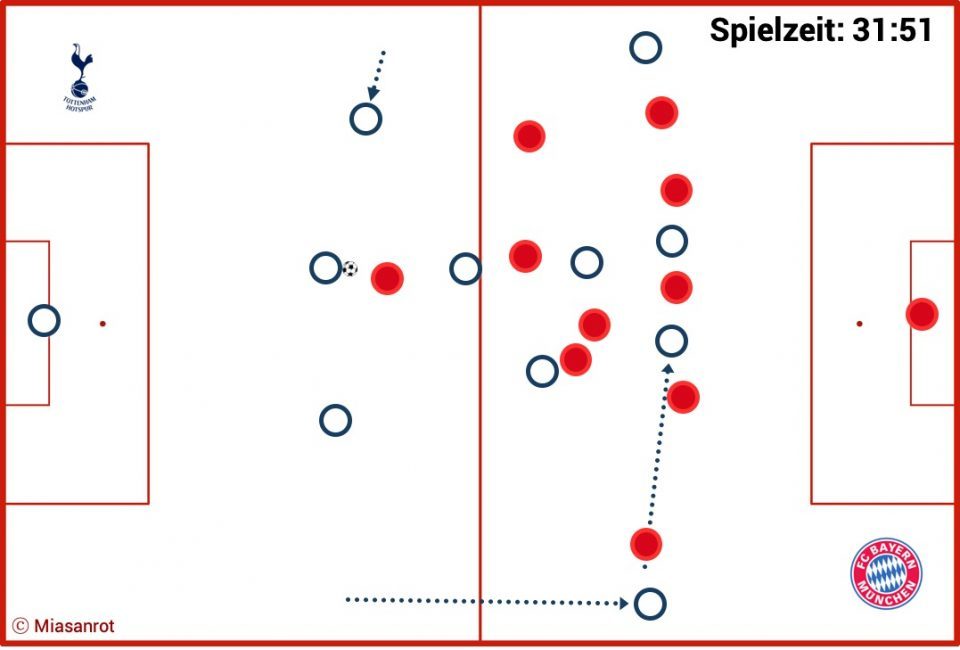
Another key aspect for Bayern will be their actions against the ball. Their contest with Tottenham in the Audi Cup demonstrated some of Pochettino’s preferred tactical elements, for example the aforementioned high full-backs and tucked-in wingers.
Tottenham usually has one full-back positioned high while the other one remains deep. In the situation depicted above, Tottenham overloads the centre, thus forcing Fiete Arp to stay close to his opposite full-back. This renders Bayern a man short in their front pressing line, allowing Tottenham to build up without much pressure.
This must not happen on Tuesday night, if Bayern are to remain first in their group. Tottenham tend to make mistakes in their build-up play, especially when put under pressure. A lot of their decision making under pressure this season has been a bit suspicious. They also exhibit unaccustomed problems at closing down the opposition, both of which harms their game in possession as well as their gegenpressing. If Tottenham opt for a back three, Bayern may try to force Tottenham to play the ball out to the wings, where they then are put under pressure, which is one of Kovač’s most favourite means of winning back the ball.
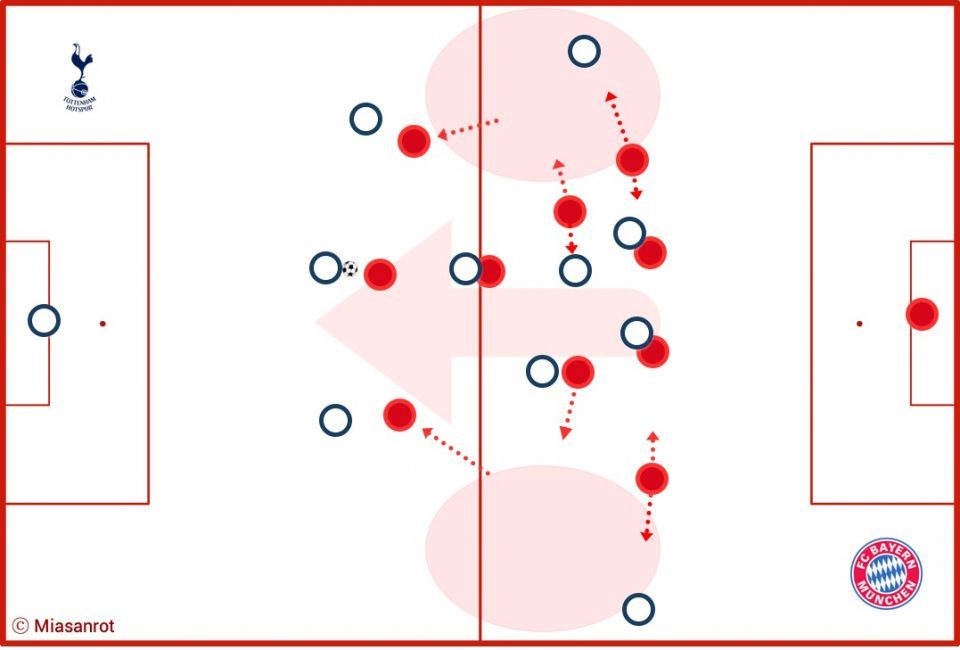
In contrast to a real-life situation, Bayern is positioned much higher and has assumed a much more compact shape in this fictitious example, allowing them to vertically compress Tottenham. Additionally, Bayern’s wingers create numerical equity with Tottenham’s back three. In midfield, Kovač often relies on man marking. This would be particularly important in the zone of rhe holding midfielders, to actually force the ball out to the red marked areas on the wings where Bayern has the numerical advantage
Who takes control in midfield?
Tottenham likes to play with staggered holding midfielders. One always remains deep to support his team’s build-up play, while the other one moves up to link up with the number eights and wingers.
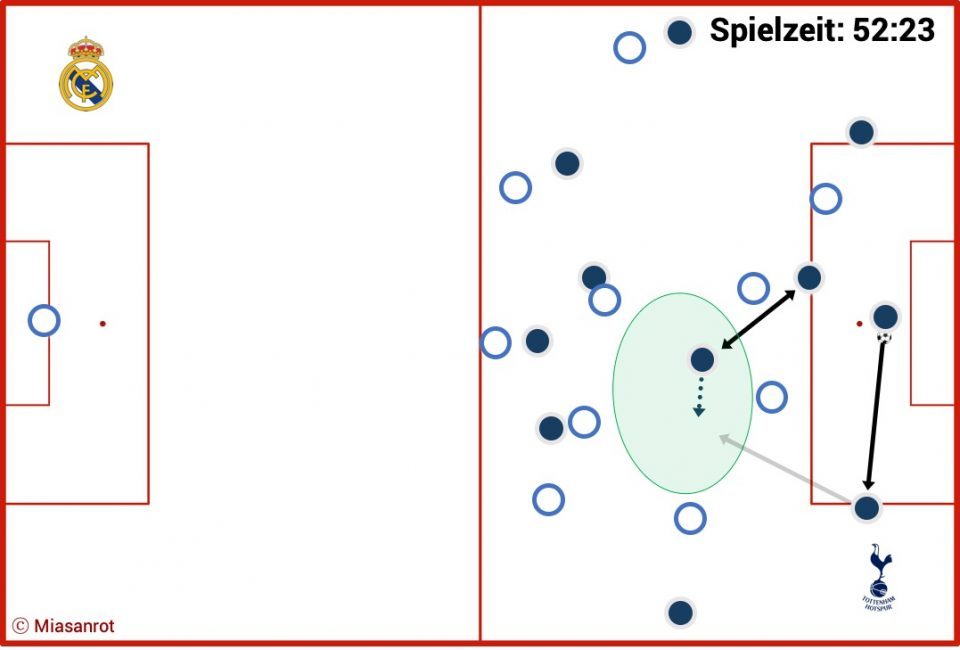
This situation from the Audi Cup is a perfect example of this. One of Tottenham’s holding midfielders draws out one of Real’s forwards, thus creating the green marked open space. Hugo Lloris plays the ball to his left centre-back who now has the choice of passing the ball on to the high left-back or the higher of the two holding midfielders.
Tottenham does this frequently to shift the play from the outside back to the center. There they rely on the creativity of their central players to eventually find the vertical pass in behind the last defensive line:
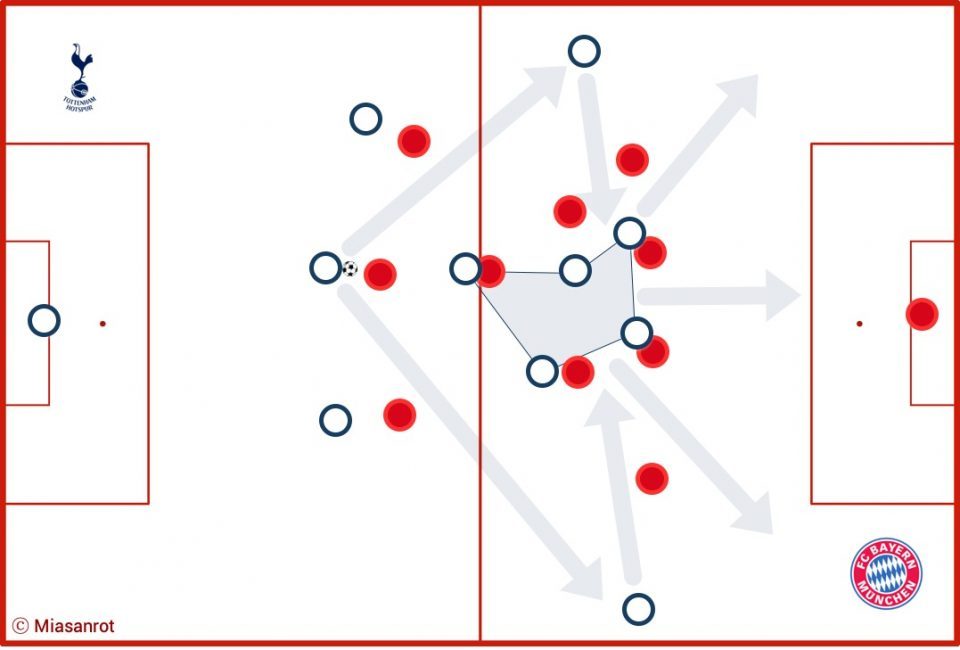
Their technically very skilled players in the middle enable them to outright overpower the opponent with speed and precision. However, they tend to be met with problems when their wingers are isolated from their central players. It will hence be important for Bayern to promptly engage Tottenham on the wings and block the passing lanes into the center. If they manage to do this, it is theirs to decide which route the ball has to take.
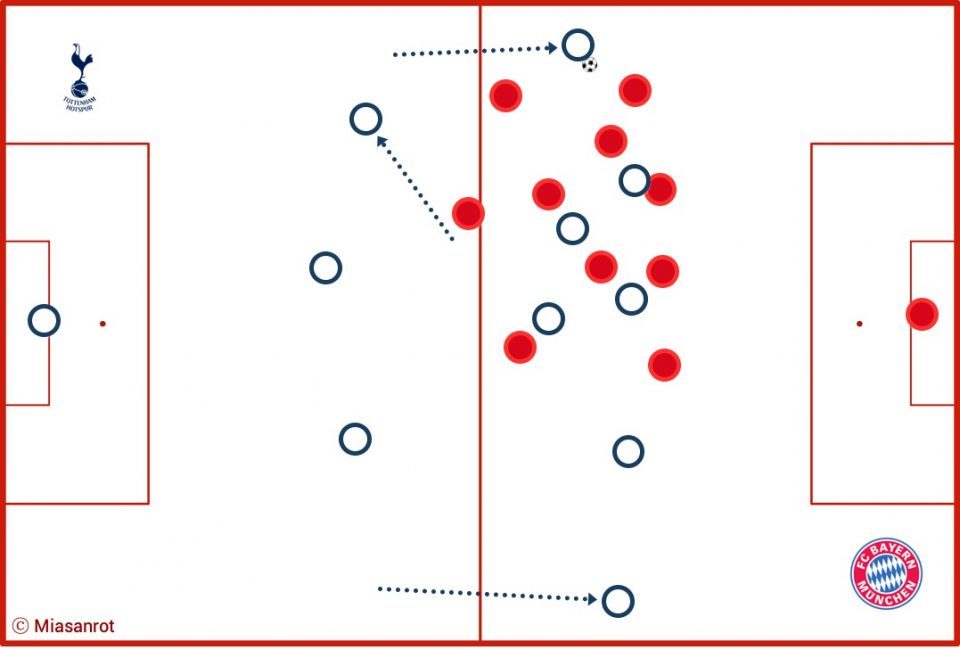
If Bayern manage to shift while keeping their shape fast enough and in an organized fashion, they may be able to win the ball in interesting areas, especially if they are able to exploit Tottenham’s propensity for having one of their holding midfielders sit deep. Then they would have a great deal of open pitch in front of them, which Olympiacos was able to use too good effect in their earlier encounter with Tottenham.
Who makes the better compromises?
Foootball can be very simple sometimes. At least on paper. Because as our analysis has highlighted, both team’s strengths and weaknesses are distributed in a way that almost every possible constellation would demand another type of player. Therefore, both Pochettino and Kovač will have to make compromises. Making compromises always implies that no one can have their cake and eat it too.
For Bayern this means that they have to make a decision between several things. Do they want to control the game out of situations in possession? Then, a midfield consisting of Thiago, Kimmich, and Coutinho with a deep sitting full-back as an additional safety measure would be most advisable. If they want to win the game through capitalising on moments in transition after winning the ball in gegenpressing, then Thomas Müller would probably be the preferred option as the player behind Robert Lewandowski because he is much better at pressing than Coutinho. Every decision has its pros and cons. Everything depends on what the coaching team prefers.
The coaches have repeatedly proven that they can prepare their team for every kind of opposition in recent weeks. But Pochettino is a very clever man. He will be able to create problems for Bayern during the match by making tactical adjustments to his approach. Although Tottenham must be counted among Europe’s top teams since last season at the latest, Bayern will be the favourite in Tuesdays game. Tottenham is a team out of form and the pressure on Pochettino in the media has been mounting in recent weeks. Nevertheless, it would be only to Bayern’s detriment if they underestimated their opponent’s indubitable class.
At the end of the day, Tottenham really is the hard test that Rummenigge has cited. Whether Bayern is doing to be equal to the challenge will depend on their ability to make the better compromises. “We still need time to improve”, Pochettino said last week. It is up to Bayern to not give Tottenham this time and double up on their ambitions for the Champions League on Tuesday.









